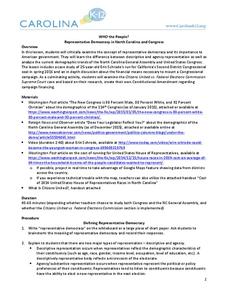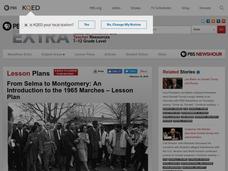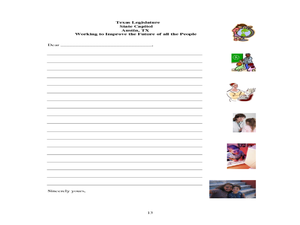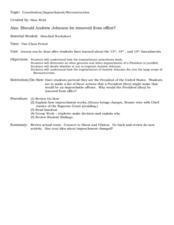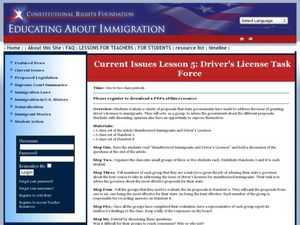Stanford University
Civil Rights or Human Rights?
Young citizens consider the American civil rights movement as part of the global struggle for human rights. After using a timeline activity to learn about the major events in the civil rights movement, class members study...
Curated OER
Teaching With Documents: U.S. Constitution Workshop
What does it mean to be American? Explore the constitution and what it really means to be a citizen here. First, learners of all ages will investigate different primary source documents. Then, they establish each document's...
Curated OER
Branches of Government Worksheet
This is a basic multiple choice activity. Learners answer a set of 9 multiple choice questions about early colonists and branches of government. You might use this as a check for understanding or a quick quiz. The first 2 questions are...
Curated OER
Showdown on the Frontier
Especially critical following a series of shootings in schools, theaters, and religious buildings, it's safe to say that we need to evaluate the current laws on gun control. Eighth graders read a New York Times article in order to better...
Curated OER
Driving Safety and Distractions
Students research process necessary to add local or state law limiting such driving distractions as cell phones or other technological devices, interview city leaders or legislators, research areas that already have such legislation and...
Carolina K-12
Who the People? Representative Democracy in North Carolina and Congress
Our elected officials are supposed to represent us, but what does it mean when they aren't like us? Budding citizens explore the demographic makeup of the US Congress, the role of money in political elections, and the Citizens United...
Curated OER
Congressional Moments
Students listen to clips from Congressional Moments radio programs to examine role government plays in our lives, and discuss role of citizens in a representative democracy.
University of Arkansas
Promises Denied
"Promises Denied," the second instructional activity in a unit that asks learners to consider the responsibilities individuals have to uphold human rights, looks at documents that illustrate the difficulty the US has had trying to live...
PBS
From Selma to Montgomery: An Introduction to the 1965 Marches
The 1965 Civil Rights marches from Selma to Montgomery and the resulting Voting Rights Act of 1965 are the focus of a social studies lesson. The resource uses film clips to inform viewers not only about the discrimination that gave rise...
Curated OER
Lesson Plan: The Net Neutrality Debate
Should Internet users who send data-heavy content pay higher fees than those who are involved in activities, like sending an email, that have less content? This question is at the heart of the Net Neutrality debate. After watching a PBS...
Curated OER
Women in Texas Politics: Winning the Vote, Three Pioneers, and Serving the People
Fourth graders study women's involvement in Texas politics. In this US history lesson, 4th graders discuss woman suffrage, examine three Texas female pioneer legislators by reading biographies, and explore women's issues by generating a...
Curated OER
Constitution/Impeachment/Reconstruction
Eleventh graders analyze a chart comparing U.S. census data from 1850, 1880, 1900, and 1920. They read a handout summarizing immigration legislation from 1882-1996 and create a graph charting how open / closed U.S. immigration is over time.
Teaching for Change
A Documents-Based Lesson on the Voting Rights Act
How did the Voting Rights Act affect the daily lives of American citizens? A document-based lesson developed by the Student Non-Violent Coordinating committee (SNCC) presents a case study of the impact of the Voting Rights Act of 1965 on...
State Bar of Texas
Baker v. Carr
Can the federal government override the state government to protect the citizens of the United States? The 1962 Supreme Court case Baker v. Carr outlines the issue of equal protection under the law. Scholars investigate with a short...
Curated OER
The President's Roles and Responsibilities: Communicating with the President
Young scholars examine the roles and responsibilities of the U.S. president and their own roles as citizens of a democracy. They explore various websites, listen to a State of the Union address, and write a letter to the President of the...
C-SPAN
The Role of the Executive Branch in Policy Making
Although the president of the United States does not have the power to pass laws, they can propose legislation, veto bills passed by Congress, and issue executive orders that bypass Congress. Six video clips show middle schoolers these...
Curated OER
Our Country's People Crossword Puzzle
In this US citizens worksheet, students complete a crossword puzzle by answering 19 clues. They use words from a word bank at the bottom of the puzzle, which includes ancestor, citizen, government, president, and immigrant.
Curated OER
The Alien and Sedition Acts: Defining American Freedom
Young scholars analyze the Alien and Sedition Acts. In this Bill of Rights instructional activity, students listen to their instructor present a lecture regarding the details of the Alien Act and the Sedition Acts. Young...
Curated OER
Technology and the Media
Students are introduced to the roles and influence of technology and the media on American representative democracy. They examine the effects of the Internet on citizens' role in government and the role and effects of media on the...
Curated OER
Tuning Out Telemarketers
Students research the laws for telemarketers in your state. Are any in place? If not, are any under consideration? They explore the situation to find out about any national legislation to regulate telemarketing.
Curated OER
How Ordinary People Can Have an Impact
Young scholars identify three or more ways the Federal Government impacts their daily lives and then explore ways in which citizens can influence political leaders.
Curated OER
Chief Justice Roberts Goes to Court
Students gain an introductory into the branches of government. Students research all parts of government and use Frames to create a public service announcement to teach others the parts of government and how they work.
Curated OER
Just how broken is the Senate?
Twelfth graders examine the role of the Senate in the United States. In this American Government lesson, 12th graders read various articles and answer questions to these articles. Students write a letter to their Senator on a...
Curated OER
Driver's License Task Force
Students read a handout on unauthorized immigrants and discuss questions. In this current events lesson plan, students engage in a simulation in which they are advisers to the state governor. Students analyze several proposals and try to...





